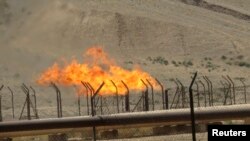The Kurdish group that controls Iraq's Kirkuk oilfields has agreed with Baghdad to keep crude flowing from the region through a pipeline to a Turkish export terminal on the Mediterranean, a Kurdish official told Reuters on Wednesday.
Kosrat Rasul said the deal was reached on Tuesday between his group, the Patriotic Union of Kurdistan (PUK), and Iraqi Prime Minister Haider al-Abadi.
The pipeline carries 150,000 barrels per day (bpd) of Kirkuk crude for export to world markets via Ceyhan, in Turkey.
The PUK withdrew its threat to shut the pipeline after the Iraqi government decided to increase further the capacity of the Kirkuk oil refinery, a Kurdish source close to the talks said.
The Oil Ministry in Baghdad announced on Wednesday that an additional processing unit of 10,000 bpd had begun operating, boosting the plant's capacity to 40,000 bpd.
Another unit, also with a capacity of 10,000 bpd, should come on stream before the year-end, said a ministry statement, citing a message from oil minister Jabar al-Luaibi to Abadi.
The source said the additional output would improve fuel distribution in the PUK-held regions of Kirkuk and Sulaimaniya and create jobs for locals.
"The agreement ended the problem and there is no deadline anymore" to shut the pipeline, said Rasul, who is the PUK deputy secretary-general, giving no further details.
PUK forces seized the Kirkuk facilities last week, briefly suspending oil flows and threatening further action if its demand to have a share in the revenue were not fulfilled.
The Kurdistan Regional Government, led by President Massoud Barzani and based in the capital Erbil, began independent exports of oil from Kirkuk in 2014 but cut a deal with Baghdad last year to split the revenues equally.
The deal has been opposed by the PUK, the historic rival of Barzani's Erbil-based ruling Kurdistan Democratic Party.
The oilfield was run by Baghdad's North Oil Co until 2014, when Kurdish peshmerga forces took control of the Kirkuk area after Islamic State militants overran around a third of Iraq and Baghdad's local forces disintegrated.
The current Kirkuk oil-sharing deal between Erbil and Baghdad was agreed by the Iraqi prime minister and Kurdish Prime Minister Nechirvan Barzani.
Prior to the signing of the deal, local Kirkuk authorities and some executives from Iraqi state oil firm SOMO were suggesting exporting oil from Kirkuk via Iran.





